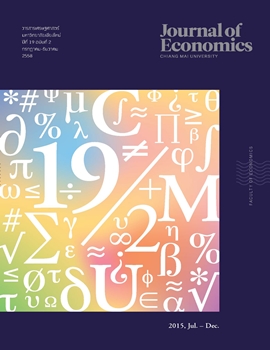การศึกษาจากกรณีศึกษา Microfinance เพื่อหาแนวทางบริหารจัดการระบบให้บริการทางการเงินระดับจุลภาคในชุมชนตามแนวทางปรัชญาเศรษฐกิจพอเพียง กรณีศึกษา: 8 จงั หวดั ภาคเหนือตอนบน
Keywords:
องค์กรการเงินชุมชน, microfinance groupsAbstract
การศึกษานี้ มีวัตถุประสงค์เพื่อศึกษาจากกลุ่มองค์กรการเงิน ชุมชนที่เข้มแข็งถึงแนวทางบริหารจัดการระบบให้บริการทาง การเงินระดับจุลภาคในแต่ละสภาพชุมชนตามแนวทางปรัชญา เศรษฐกิจพอเพียง ซึ่งกลุ่มตัวอย่าง คือ กลุ่มองค์กรการเงิน ชุมชน (Microfinance) ที่เข้มแข็ง (Best Practice) จำนวน 24 แห่ง ในพื้นที่ 8 จังหวัดภาคเหนือตอนบน ได้แก่ เชียงใหม่ เชียงราย ลำปาง ลำพูน พะเยา แพร่ น่าน และแม่ฮ่องสอน
ผลการศึกษา พบว่าแนวทางการดำเนินงานขององค์กรการเงินชุมชนตามแนวทาง ปรัชญาเศรษฐกิจพอเพียง ควรมีแนวทางดังนี้
(1) ด้านความพอประมาณ องค์กรการเงินชุมชนที่เข้มแข็งมีการปล่อยกู้เพื่อการ ลงทุนให้สมาชิกในวงเงินตามระดับการออมของสมาชิก มีการจำกัดเพดานสูงสุดของเงิน ออม ควรมีการส่งเสริมให้สมาชิกกลุ่มการเงินชุมชนมีอาชีพเสริมที่ก่อให้เกิดรายได้ ส่งเสริม การดำเนินกิจกรรมเพื่อลดรายจ่ายของครัวเรือน เช่น มีการปลูกผักสวนครัว ผลไม้ และการ เลี้ยงสัตว์ ลดค่าใช้จ่ายที่ฟุ่มเฟือยต่างๆ ส่งเสริมการดำเนินกิจกรรมปรับเปลี่ยนพฤติกรรม เช่น ลดหรือเลิกอบายมุข สุรา ยาสูบ หวย และการพนัน เป็นต้น
(2) ด้านความมีเหตุผล องค์กรการเงินชุมชนที่เข้มแข็งมีการดำเนินงานโดยการ จัดทำแผน/โครงการ/กิจกรรมให้สอดคล้องกับพันธกิจ วิสัยทัศน์ของกลุ่ม เพื่อให้เกิดการ พัฒนากลุ่มการเงินอย่างมีทิศทาง มีแนวคิดในการบริหารจัดการ การให้บริการ การจัด สวัสดิการที่ชัดเจน มีการส่งเสริมสมาชิกกลุ่มจัดทำบัญชีครัวเรือนเพื่อสามารถวิเคราะห์การ ใช้จ่ายของครัวเรือน อันจะนำสู่การปรับพฤติกรรมการใช้จ่ายของครอบครัว
(3) ด้านการมีภูมิคุ้มกัน องค์กรการเงินชุมชนที่เข้มแข็งมีการประกันความเสี่ยง จากการกู้เงิน เช่นใช้สมาชิกหรือผู้ใช้บริการรายอื่น เป็นผู้ค้ำประกัน 2 คน และคู่สมรสต้องยินยอมลงลายมือชื่อในเอกสารคำขอกู้และเอกสารที่เกี่ยวข้องทั้งปวง มีการเชิญผู้มีความรู้ ความสามารถมาเป็นที่ปรึกษาและเข้ามาร่วมกิจกรรมกลุ่ม มีการส่งเสริมการจัดตั้งกลุ่ม ชุมชนหรือกลุ่มอาชีพในชุมชนเพื่อทำให้เกิดการรวมกลุ่มของคนในชุมชนเพื่อช่วยเหลือซึ่ง กันและกัน
(4) ด้านความรู้ องค์กรการเงินชุมชนที่เข้มแข็งมีการฝึกอบรมให้ความรู้หรือศึกษา ดูงานแก่คณะกรรมการและสมาชิกอย่างสม่ำเสมอ มีการสอนและจัดอบรมให้ความรู้ในการ ทำบัญชี โดยให้คณะกรรมการเป็นวิทยากร ส่งเสริมให้สมาชิกมีการเรียนรู้และอบรมใน แนวทางปรัชญาเศรษฐกิจพอเพียงเพื่อใช้ในชีวิตประจำวันที่จัดโดยหน่วยงานต่างๆ ผู้นำ ชุมชน กลุ่ม/องค์กรเครือข่ายชุมชน มีการจัดเวทีเพื่อพูดคุยกันเป็นประจำทุกเดือน ส่งเสริม ให้ชุมชนมีการสืบทอดและใช้ภูมิปัญญาท้องถิ่นให้มีการถ่ายทอดและนำไปใช้ในการ ประกอบพิธีกรรม การทำการเกษตร การประกอบอาชีพของหมู่บ้าน มีการส่งเสริมจัดการ ความรู้ในชุมชนบันทึกภูมิปัญญาท้องถิ่น
(5) ด้านคุณธรรม องค์กรการเงินชุมชนที่เข้มแข็งควรยึดหลักคุณธรรมในการ บริหารงาน ดำเนินงานโดยมีความซื่อสัตย์ต่อกัน มีความเสียสละเพื่อส่วนรวม มีความ รับผิดชอบ มีความเห็นอกเห็นใจต้องการช่วยเหลือกันและกันและมีความไว้วางใจซึ่งกันและ กัน เป็นต้น ส่งเสริมให้คนในชุมชนส่วนใหญ่มีการปฏิบัติตามหลักพระพุทธศาสนา
The present study aims to investigate the 24 cases of best practice microfinance groups relating to the management in implementing the sufficiency economy philosophy in 8 upper-northern provinces covering Chiang Mai, Chiang Rai, Lampang, Lamphun, Phayao, Phrae, Nan, and Mae Hong Son.
It is imperative for microfinance organizations/groups to implement the following processes to foster the sufficiency economy concepts as follow:
(1) Moderation: Release loans for members to make investment at the size proportional to their savings, set maximum ceiling of savings, promote the development of secondary occupation for members to earn extra income, encourage reasonable and modest spending behavior, promote household expenditure cutting activities like home gardening and fruit tree planting as well as animal raising, urge cutting down extravagant spending beyond what are necessary for daily life and occupational undertakings, and advocate the arrangement of activities inducing behavioral change like lessening or completely stopping involvement in evil path including alcohol, cigarette, underground lottery, and various gambling.
(2) Reasonableness: Develop plans/programs/activities to mutually support the organization’s missions and visions such that the microfinance group can advance in a clear direction as well as has clear concepts in management, services and welfare provisions, and provide support for group members to be able to keep household financial records or accounting for the reason that they can be able to analyze household expenditure as basis to determine behavioral change in spending pattern.
(3) Immunization: Prevent lending risk by requiring each borrower to provide two guarantors and having his/her spouse give a statement of consent and sign his/her name in the loan application form and in all other relevant documents, invite group consultants to participate in the group’s activities, provide support for establishment of community group to bring about mutual help group formation among community members.
(4) Knowledge: Arrange regular knowledge training sessions or field study activities for committee and group members, provide teaching and training on book-keeping by having the committee members serve as the instructor and trainer, arrange the facility for group members meeting to share experiences, encourage group members to learn – by – doing the sufficiency economy philosophy in their daily organized by various public and private agencies, arrange discussion forum regularly every month, encourage group members to promote the inheritance, transfer, and application of local knowledge for the purposes of ritual performance, farming practices, and professional undertakings in the village community, and promote the activities concerning knowledge management in the community including documentation of local knowledge.
(5) Ethical integrity: Adhere to moral disciplines in management with the principles of honesty, sharing or generosity, responsibility, kindness, and mutual trust; encourage the majority of community members to practice according to the Lord Buddha’s teachings on various important Buddhism events.
Downloads
Issue
Section
License
All opinions and contents in the CMJE are the responsibility of the author(s). Chiang Mai University Journal of Economics reserves the copyright for all published materials. Papers may not be reproduced in any form without the written permission from Chiang Mai University Journal of Economics.






